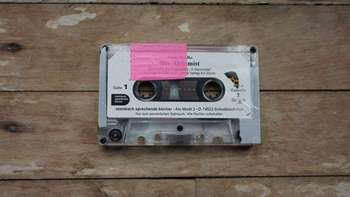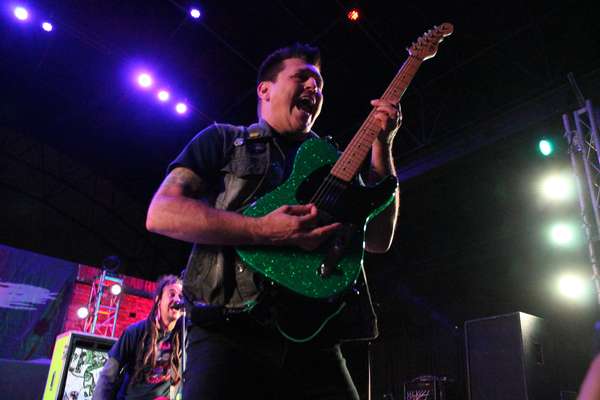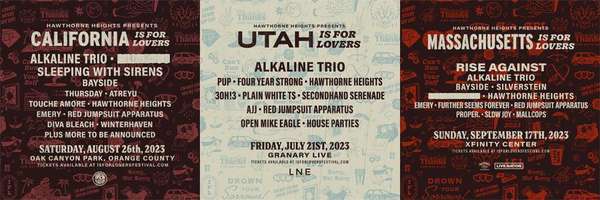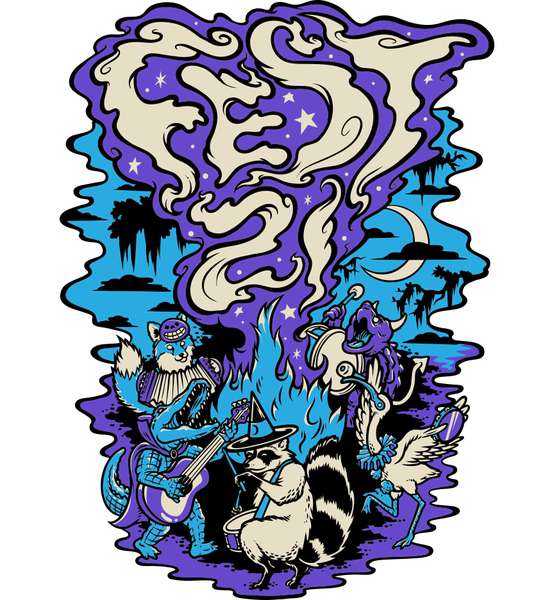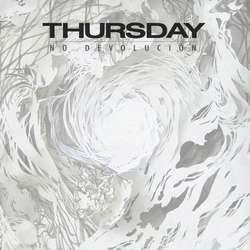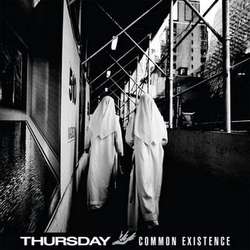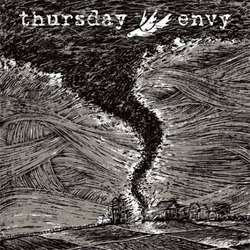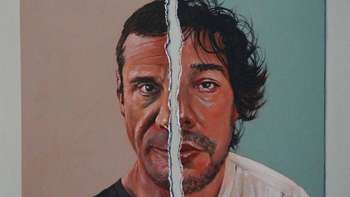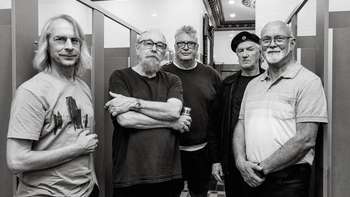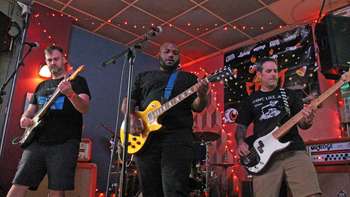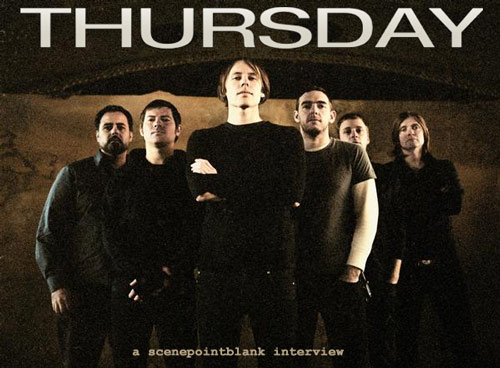
Since the release of Waiting a decade ago, Thursday has been a consistent yet ever-evolving force in the underground music community. We spoke with vocalist Geoff Rickly on the band's Fall headlining tour discussing the band's evolution of sound, his literary and musical influences, and the joys of being a musician in this economic climate.
Scene Point Blank: You've been quite busy touring in support of the new album since its release early this year. How does one go about invigorating oneself for life on the road?
Geoff Rickly: I just try and take care of all the little details. Make sure that I do all of my laundry, have a sewing kit, and have all my toiletries in order. I know it seems weird, but it seems to put me at ease.
Scene Point Blank: Now that the initial itch to play new material out has worn off, is it difficult to maintain excitement for playing these songs at shows?
Geoff Rickly: We're playing a pretty substantially different set list. Where as with Taste of Chaos we were doing, "Counting 5-4-3-2-1," "War All the Time," "At This Velocity," and "Cross Out the Eyes." Tonight we don't play any of those songs but we do play "Between Rupture and Rapture" and "Division St." And as far as new songs go, we play "Circuits of Fever" and some nights we play "Love Has Led Us Astray" and others it is "Subway Funeral." This tour, I really wanted to make sure we're playing a completely different set with just a few staples that we always play like "Understanding in a Car Crash," but we're also bringing back some old stuff we haven't played like "Paris in Flames." We're just remembering to have fun some of the old ones and trying out new stuff. It's one of those things, you play long enough you're going to have so many songs to choose from.
Scene Point Blank: Looking at the lineup for the tour, you've made some interesting choices. How instrumental were the members of the band in choosing the tour lineup?
Geoff Rickly: It was just us bringing out bands that we love that we think people should be exposed to. Young Widows is one of the best indie rock bands around today. Their last record is probably one of the most punk rock records I've heard in a long time. It's half live and it recalls bands that I listened to growing up: Jawbox and Fugazi -truly great bands. I think they put their own stamp on it. It's like, these are our influences and here is Young Widows. La Dispute reminds us when we were young, playing small, basements. Really sincere and open hearted kids.
Scene Point Blank: Speaking of smaller shows, do you ever find it difficult to connect with larger audiences?
Geoff Rickly: Sometimes. You can't treat it as taking the same thing you do in a small club to a big stage. It's not the same thing; it's totally different. It's kind of its own art form and you have to give it the respect it deserves. Playing a big show for a lot of people is different way of present music. And we would always struggle to take the small intimate show to a big place. And maybe that's not the best approach. Maybe, you got out there and you acknowledge the difference, that it isn't' going to be the same as a VFW hall, but on the other hand, we're going to play really well and make it sound amazing, and give you a different sort of show. That's just a really cool thing that I've noticed as I've gotten older. It's just like you can't make a record sound like it would live. It has its own charms that you should exploit and find out how to use.
Scene Point Blank: The band just released a digital deluxe version of "Common Existence." Were there specific reasons those songs were left off the album?
Geoff Rickly: It's three new songs, a remix and a demo. We thought these are great songs, they just don't push the envelope of the album as much as the other songs do, it's more traditional Thursday. But a lot of people really love that, so we decided to put them out there and hopefully that will also give the album a little bit more love to people that never checked out the record in the first place. And for people that already have the record you can buy the songs separately. So its not like we're trying trick kids into buying it twice.
Scene Point Blank: How did the remix by Innersystemparty come about?
Geoff Rickly: We were on tour with them in Europe. They were really nice kids, really talented. We shared a bus and they would DJ for us every night on the bus. And we would be like, "Damn, this is cool shit." They exposed me to a bunch of house music, which I don't know about at all, and some other stuff. We just started talking about the ups and downs of remixing. And they talked about "Circuits of Fever" and we told them that if they ever wanted to remix it we have all the tracks for it. They really change the tone of the song. Made it a lot colder.
Scene Point Blank: As Thursday has evolved over each new recording the music has become much more complex with an increasingly more layered and textured sound. This is especially evident on "Common Existence." Has this been a conscious effort?
Geoff Rickly: It is sort of the way that the band has developed. We've gotten noisier, more experimental, and more intricate. We probably could have gone in a lot of different directions; we could have stripped it down leaner and more powerful in some ways. There is a lot of ways we could have developed if we set our minds to going a certain way. But it just sort of ended up that way.
Scene Point Blank: With "Waiting," "Full Collapse" and "War All the Time" the focus of the albums, to me, seemed to almost be directly focused on the vocals and lyrics. However, with "A City by the Light Divided" and "Common Existence" there was a shift in the focus away from the vocals and lyrics (not that they weren't an integral part) and towards the musical aspect. Is this something that was intended or just how the albums ended up?
Geoff Rickly: The music has definitely come to dominate the songs more than the vocals on the new material, which I have mixed feelings about. I think if you could understand the lyrics more that'd be good, but I do like the way the records sound now. I think you have to dive a little deeper to get at the content, but I think it becomes more worth it. A City by the Light Divided really overwhelmed the vocals, put them in the backseat. And on the new album we split the difference, "When I'm saying something really important, let's let them come to the front." When the music is taking over lets let the vocals fall back. It's give and take. There are parts on the new record where the vocals overmatch everything and are really really on top. It's funny, I've had more people say to me, now that you can really sing its buried in the mix. I don't think it's really true, I think it's a different presentation and a higher level of singing. I think you can still make it fit into the overall picture.
Scene Point Blank: How involved are you with the writing process of Thursday? The norm for most vocalists is to just appear in the studio with some lyrics or melodies and go for it. Is this how things are for Thursday? If not, what exactly is your role?
Geoff Rickly: I don't really start the melodies until the songs are completely finished. Sometimes, if I think it is a really cool part, that could be a chorus, I will suggest that we should repeat that for a hook. But I am pretty involved, I try to encourage the band into certain directions I see the song going as we write. I definitely don't wait for them to come up with songs. So there is a lot of chemistry with the handing off of parts.
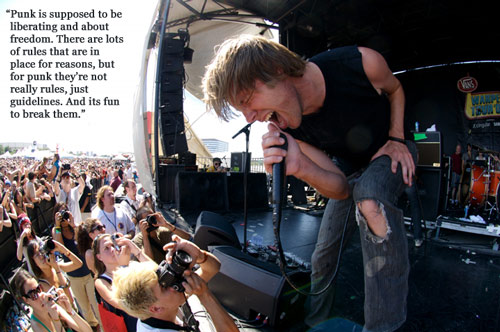
Scene Point Blank: While the band was both writing and in the studio recording the album, you were not signed to a label. Did being free of label obligations affect the mood and process of both the writing and recording of the album?
Geoff Rickly: It was very different, not knowing where it was coming out. We thought, "We can do whatever we want." It's a great feeling, but hopefully we would find some place to put it out. We had a lot of offers but did not decide at that point. It was like we were a young band again, not having business interests convince us to do something.
Scene Point Blank: Thursday titles and lyrics often reference various literary writers - Bukowksi, Paz, Palmer, Bolano. Where else do you draw your lyrical inspirations?
Geoff Rickly: To me, you can't separate the pieces that make up your life. If something important happens to you while you're listening to Neil Young, that song is now a part of the experience. If you're reading Bukowski, going through something, you think about it in that way. I don't try to extricate those influences in an effort to become fully original. I don't think anyone is fully original. The things we're reading and talking about influence us. To me, you should throw it all in. And I realize that is sort of a post-modern cliché. But that's how it is; it is more of a group of voices. You can't even tell if you've had an original thought because somewhere, sometime you might have seen it on a billboard someplace.
Scene Point Blank: Would you attribute this mindset a throwback to the screamo bands that you grew up listening?
Geoff Rickly: A lot of them were more direct. I'd be watching Saetia and he'd be reading poetry while the rest of the guys would be playing music. I never thought, "That's too pretentious to me." I think, "That's cool. I like that." I just try to adapt traditions that were a part of something I was into that is more our own voice and not trying to be a copy of others.
Scene Point Blank: Is a revisiting to those ideas what inspired you to start up United Nations?
Geoff Rickly: United Nations was just an idea I had with some friends for years and years. And it actually became a band and we recorded a record. And then all this stuff happened around it. But we really had fun together. So we kept on doing stuff. The goal was getting back to our traditional screamo days. Trying to do something that is true to the traditions with short songs and lo-fi recordings. We wanted to do something that was highly conceptual, like Nations of Ulysses, but make it so you don't even know who the people are. Some of the people were under contracts and major labels so it just made it easier.
Scene Point Blank: Much has been made of the failing music industry and lackluster record sales. What is your assessment of the industry on both the major and indie level?
Geoff Rickly: I've met great people in both worlds. In general, I think that indie is better for Thursday and better for most punk rock in general. I think that every so often its cool that a label will give hundred of thousands of dollars to a punk rock band to make a record that is going to bring out all their friends. I'm really proud that a lot of my friends got to make some money off of a major label. And I think that being in a punk band, there is nothing more fun that pissing everyone in the underground off for being on a major label. Punk is supposed to be liberating and about freedom. There are lots of rules that are in place for reasons, but for punk they're not really rules, just guidelines. And its fun to break them.
Scene Point Blank: A few years back, several Thursday demos surfaced online through file-sharing groups. This time around, no recordings leaked, did you take any steps to avoid another leak of this nature?
Geoff Rickly: We didn't demo anything this time because we knew it would happen again. We did really rough outlines in Rockband and never gave them to the label. They said whatever you come up with would be cool. They heard the split and loved that, so it just made it a lot easier. It's just odd when you do the demos and you have this inferior version of the song and everybody gets really attached to it.
Scene Point Blank: Finally, you originally attended school to become a teacher but once Thursday became a full-time endeavor, you put that on hold. What is it about writing and performing music that is so rewarding to you?
Geoff Rickly: Having your own destiny is a lot of fun. It's really really scary to be a small business owner in this economy, which is what you are when you're in a band. I think that it is a lot easier to be a poor artist than to be a poor anything else. I think that so much of your passion goes into your music; you don't have to go out and spend money to have a good time. You're home, you're playing guitar, and you're singing songs with people coming to see you. And I think that's a real blessing. Even though right now I'm as poor as I've ever been in my life I still feel really lucky doing what I'm doing now. If I were a high school teacher right now, I might be out of work; teachers are getting laid off everywhere. I would be trying to find something to do to make me feel good about my life. So I do feel really lucky that I can do what I do and not feel bad about it.
Scene Point Blank: After Thursday has run its course do you intend to pursue your teaching efforts again?
Geoff Rickly: I don't know. All my of my credits have expired and I don't if I want to start all over again. I was in my last year and I don't know if I'd want to do four years again. Also, I'm not sure if I'd want to be a teacher anymore but I'm not sure that I wouldn't want to be one either.
Scene Point Blank: Hard to anticipate how you would feel at that point in time.
Geoff Rickly: I know right now I wouldn't want to do it. I really enjoy having really honest conversations with kids at shows. But I have friends that are teachers that say that there is so much you can't say because its' "inappropriate," doesn't follow curriculum, and it doesn't follow the polices of the school, even if you know the polices are fucked. So, it'd be really hard and go in and do the hardest part of the work without the freedom. I think I want to stay somehow art-focused for the rest of the life, if I'm allowed to do so by the fates.
Scene Point Blank: What's in store for the remainder of the year as far as touring?
Geoff Rickly: There is Europe with Rise Against and Poison the Well. And we have a tour with The Dillinger Escape Plan and Fake Problems for the U.S. so that should be fun.
Words: Michael | Graphics: Matt
- Official Thursday Website: http://www.thursday.net
